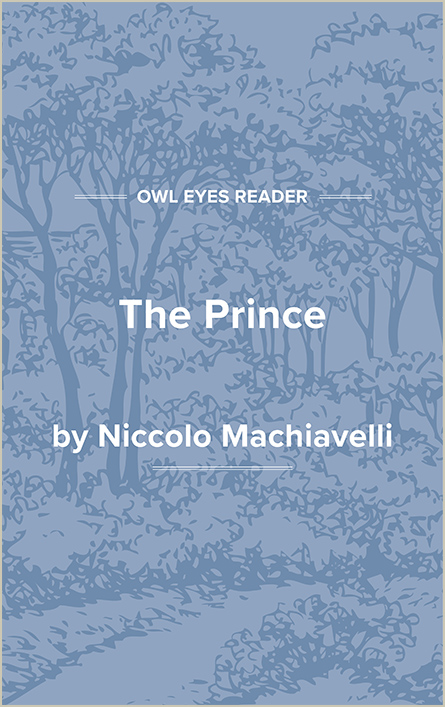Study Guide
Summary
The Prince is the book that gives meaning to the adjective Machiavellian. The book is an ingenious and fascinating study of the art of practical politics, composed by a man who never rose higher than the position of secretary to the second chancery in Florence. The success of The Prince can be attributed partly to Niccolò Machiavelli’s wit and partly to his having known some of the most clever and powerful rogues of the Renaissance. His model for the “prince” was Cesare Borgia, who used all means of conquest, including murder, to achieve and hold political power.
Machiavelli never pretended that his book was a guide to the virtuous. On the other hand, he did not set out to prescribe the way to wickedness. He meant his account to be a practical guide to political power and, through a combination of experience, logic, and imagination, he constructed one of the most intriguing handbooks of Western civilization: a primer for princes.
In beginning a discussion concerned with the manners and attitudes of a prince—that is, a ruler of a state—Machiavelli writes, Since . . . it has been my intention to write something which may be of use to the understanding reader, it has seemed wiser to me to follow the real truth of the matter rather than what we imagine it to be. For imagination has created many principalities and republics that have never been seen or known to have any real existence, for how we live is so different from how we ought to live that he who studies what ought to be done rather than what is done will learn the way to his downfall rather than to his preservation.
This passage makes it clear that Machiavelli intends to explain how successful politicians really work rather than how they ought to work.
The Prince begins with a one-paragraph chapter that illustrates Machiavelli’s logical approach to the problem of advising prospective princes. He claims that all states are either republics or monarchies. Monarchies are either hereditary or new. New monarchies are either entirely new or acquired. Acquired states have either been dominated by a prince or been free; they are acquired either by a prince’s own arms or by those of others; and they fall to him either by fortune or because of his own character and ability. Having outlined this inclusive logical bifurcation, Machiavelli first discusses the problems connected with governing a hereditary monarchy, then discusses mixed monarchies.
In each case, as he develops his argument, Machiavelli considers the logical alternatives, and what should be done in each case if the prince is to acquire and hold power. In writing of mixed monarchies, for example, he points out that acquired states are either culturally similar to the conquering state or not, and then considers each possibility. If the acquired state is culturally similar, it is no problem to keep it; but if the acquired state is different in its customs, laws, or language, then there is a problem to be solved. One solution might be to have the ruler go to the acquired territory and live there. As an example, Machiavelli refers to the presence of the Turkish ruler in Greece.
Another possible solution to the problems resulting when an acquired territory differs culturally from the conquering state is the establishment of colonies. Colonies are inexpensive to acquire and maintain, he argues, because the land is acquired from a few landowners of the conquered territory, leading to few complaints. Such a plan is preferable to maintaining soldiers, for policing a new state not only is expensive but also offends the citizens being policed.
Thus, by the device of considering logical alternatives, Machiavelli uses his limited experience to build a guide to power. What he says, although refreshing in its direct approach to the hard facts of practical politics, is not entirely fanciful or naïve. Not only did Machiavelli, through his diplomatic missions, come to know intimately such leaders as Louis XII, Julius II, Maximilian,...
(The entire page is 1,641 words.)
Owl Eyes subscribers get unlimited access to our expert annotations, analyses, and study guides on your favorite texts. Master the classics for less than $5/month!

